Chinese Marriage: Society, Customs and Ceremonies
Chinese Marriage Through a Foreigner's Eyes
- by Alan Paul TrundleyFor a brief introduction to Chinese marriage traditions in history, see Chinese Marriage Custom. Perhaps a big difference for many foreigners is that in PRC marriage is seen as a joining of families, such as it was in the past in western countries. Given that most children are from one child families, it is easy to understand that parents take a keen interest in who their 'child' marries. Foreigners should also remember that the child is responsible for looking after the parents in their old age.
In many countries there are three components to a wedding: the legal, a ceremony perhaps religious, and a 'party'. This is essentially true in PRC. The legal element can only be completed by the officials in the offices of the Civil Affairs Bureau. Many couples marry officially and then proceed to the ceremony and or party the next weekend, or even later.
China has full religious tolerance so any couples wanting a religious ceremony can have one of their choosing. Others sometimes choose a non-religious traditional style ceremony quite likely related to the region or ethnic group they are from. Given the size of China and its range of ethnic groups, it is easily understood that there is much variety throughout the country. There is a growing interest in reviving traditional ceremonies. Visitors who not themselves marrying should take any opportunities they have to view a wedding ceremony.
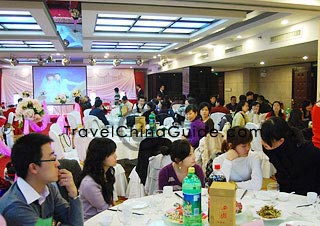 |
| Wedding Banquet |
Usually, there will be speeches complimenting and praising the couple and the families, and offering good wishes for the future. There will not be a speech by a 'best man' insulting and seeking to embarrass the groom as we are used to in the Anglo-American tradition!
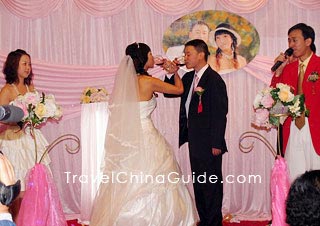 |
| The couple drink wedlock wine |
There are many traditional aspects to a western wedding – that typically women know well and men say 'yes' to, such as a bride wearing 'something old, something new, something borrowed, something blue'; the groom not seeing the bride before the wedding; or the idea that girl that catches the bride's bouquet will be the next to marry. In PRC, there are similar things. The bride must wear new shoes, the bride's family may act trying to prevent the bride meeting the groom and so leaving her parents, while the groom's family tries to get the bride and her entourage into the groom's family home. There is also a tradition of visiting the bride's parents on the third day after the wedding with an associated series of rituals such as further meaningful gifts and even the returning of some gifts. Such traditions are varied as is the desire of families to follow them.
Foreigners and men: for a happy life, be flexible to the desires of the hosts and your bride!
Wedding Photos
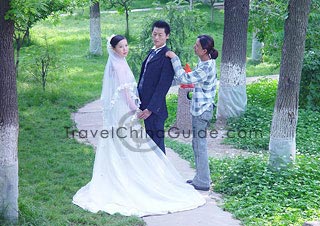 |
| Taking Wedding Photos |
One thing you can be sure, every town has at least one special shop where you can hire clothes and arrange for wedding photos. So early in the planning process visit some and see what is available. If you would like to see photo shoots in action, just go to the favoured local spots. In some cities there are very clear favourites: in Guangzhou it is clearly Shamian Island.
Engagement
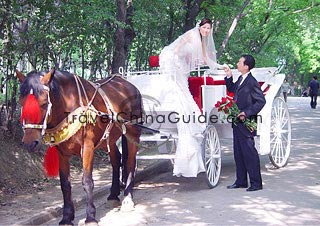 |
| Western Style Wedding Gown |
Some parents will consult a fortune teller to see if the marriage is suitable and to select an auspicious date. This can be a concern but the fortune teller will probably provide the answer then parents want to hear! If you get a negative, you clearly face an uphill struggle.
On the other hand, when you are first introduced to the parents be careful about what words are used if you are not yet committed to marriage. Some parents equate 'boyfriend' or 'girlfriend' with being engaged and if they approve of you, you could find things get out of hand!
Gifts
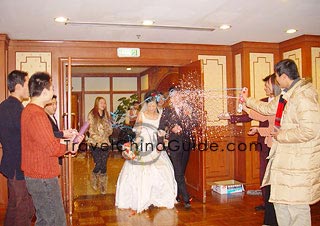 |
| Friends spray colorful flowers. |
Family and guests invited to the wedding ceremony and reception will normally provide cash gifts, traditionally in a red envelope (li shi), though other gifts are sometimes given. If a foreigner is marrying a person from a not well off family, it could be embarrassing to have the wider family members contribute money; it could be a good idea to suggest the system of gifts that many of us are used to. The gift list could then be restricted to inexpensive items. In some instances, guests at the reception contribute to the cost of the reception with the money going to the parents.
Paying for the Wedding
Advice!
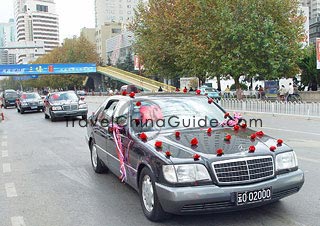 |
| Decorated Car for Wedding |
As commented on earlier you might feel that the wedding costs are rising well beyond your expectations and even your means to pay. It is more likely that it is mostly enthusiasm that causes this to happen. It is not always easy to overcome, but the best way is to try and avoid the situation arising. Discuss the style and lavishness with your fiancée, discuss what you consider a reasonable budget and try to have these established well in advance. It won't always go according to plan but the couple must have a common view of what they want.
There are also a few stories of the future parents in law demanding substantial money presents from foreigners. Large gifts are not part of modern Chinese wedding culture so in the unlikely event that you meet this situation you should get meet with other people in the same community and of a similar financial standing and discuss what is reasonable. You can then review the situation with your fiancée and try to overcome the demands. Only you can decide the right course of action.
Almost all Chinese who want to enter into an international marriage are genuine; likewise so are most foreigners. Sadly, there are some individuals who are not being totally honest. All Chinese who anticipate living in their partner's country need to consider whether they are being told the truth about their fiancée's work and lifestyle they will be going to. Clearly, you each need to find out as much about each other as possible. If the Chinese partner asks for some proof, don't be insulted, but offer it willingly. Foreigners need to consider whether the Chinese fiancée is simply seeking residency overseas and will demand a divorce soon after arrival. There is no clear way of checking this, but if from an early stage you say you would consider living in China, some will not be interested.
Fortunately these problems are not too common, though they do exist. And if you see warning signs you should not ignore them. Romance must always be tempered with good sense!